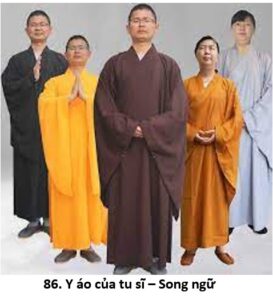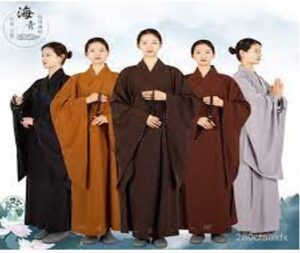86. Y áo của tu sĩ – The dress code of a monk – Song ngữ
Opening The Door Of Your Heart, And Other Buddhist Tales Of Happiness
Mở Rộng Cửa Tâm Mình
English: Ajahn Brahm
Việt ngữ: Chơn Quán Trần-ngọc Lợi
Compile: Lotus group

Chương 10: Freedom and humility – Tự do và khiêm cung
86. The dress code of a monk – Y áo của tu sĩ

Monks of my tradition wear brown robes, and that’s all we have.
A few years ago, I had to go into an Australian hospital for a few days. On admission, I was asked if I had brought my pyjamas. I said that monks don’t wear pyjamas; it is either these robes or nothing! So, they let me wear my robes.
Sư thuộc tông phái Theravada chúng tôi đắp y vàng và tôi chỉ có y vàng mà thôi. Chiếc y vàng này cũng có lắm vấn đề!
Vài năm trước đây tôi cần vào bệnh viện ít hôm. Ngay lúc nhập viện tôi được hỏi có đem quần áo không? Tôi đáp rằng các sư chúng tôi không có đồ ngủ, chỉ đắp hay không đắp y mà thôi. Họ để tôi đắp y của tôi.
The problem is that the monk’s dress looks like a dress.
One Sunday afternoon in a suburb of Perth, I was loading
our monastery van with supplies for our building work. A
thirteen-year-old Aussie girl came out from a nearby house to
speak to me. She had never seen a Buddhist monk before.
Standing before me with her hands on her hips, she looked
me up and down with utter contempt. Then she began to
scold me in a voice full of disgust: ‘You’re dressed like a girl!
That’s sick! Yuk!’
Một vấn đề khác: y chúng tôi dễ lầm với chiếc áo dài của phụ nữ. Lần nọ, trong lúc tôi đang chất lên xe vật dụng xây cất mà tôi vừa mua ở ngoại ô Perth, có cô bé lối mười ba hay mười bốn tuổi tò mò ra xem. Cô đứng chống nạnh khinh khỉnh nhìn tôi từ đầu tới chân. Phút sau, bằng một giọng rất ư căm phẫn cô quở tôi: “Ông ăn mặc giống như đàn bà! Thấy phát ghê!”
She was so over-the-top that I couldn’t help laughing. I also remembered my teacher, Ajahn Chah, advising his disciples how to respond when they receive abuse: ‘If someone calls you a dog, don’t get angry. Instead, just look at your bottom. If you can’t see a tail there, then it means you’re not a dog. End of problem.’
Nhận xét của cô làm tôi bật cười. Rồi tôi nhớ lại lời của thầy tôi, Ajahn Chah, dạy rằng: “Nếu có ai chửi con là chó, hãy nhìn lại phía sau con. Không thấy có đuôi, con tất không phải là chó. Chấm hết.”
Sometimes I get compliments for wearing my robes in
public. On one occasion, though, it gave me the shivers.
I had business in the city. My driver (monks aren’t
allowed to drive) had parked our monastery van in a multi-
storeyed car park. He announced that he was desperate to go
to the toilet, but because he thought that the car park toilets
were dirty, he wanted to use the conveniences in a nearby cin-
ema foyer. So, as my driver was attending to nature’s
business inside, I was waiting outside the cinema, standing in
the busy street in my monk’s robes.
A young man approached me, smiled sweetly and asked
me if I had the time. Monks like me are very innocent. I have
lived in a monastery for most of my life. Also, since monks
don’t wear wristwatches, I had to politely apologise that I did
not know the time. He frowned and began to walk away.
When he had only gone a few paces, it suddenly hit me
what the guy had meant. ‘Have you got the time?’ is probably
the oldest pick-up line in the book. I was to find out later that
I had been left standing in one of the most popular meeting
places for gays in Perth! The gay man turned around to look at me again and said, in his best Marilyn Monroe voice, ‘Oooh! But you do look
beautiful in those robes!’
Đôi khi y cũng đem lại cho tôi lời khen tặng, ngay giữa đám đông. Tôi có việc xuống phố. Bác tài (sư không được phép lái xe) đậu xe của tự viện trong chỗ đậu cao từng. Bác cần đi tiểu nhưng chê nhà cầu của chỗ đậu xe dơ nên đi vô nhà cầu của một rạp chiếu bóng gần đó. Thế là tôi phải đứng đợi bác trước cửa rạp. Một thanh niên đến hỏi: “Have you got the time?” (nghĩa thông thường là, ông có biết bây giờ là mấy giờ không?) Thông thường các sư không có đeo đồng hồ nên tôi cũng không đeo. Tôi thật tình xin lỗi là không biết mấy giờ. Cậu nhíu mày và bỏ đi. Lúc cậu vừa xoay lưng đi tôi chợt ngờ ngợ với câu “Have you got the time” vì nó còn có nghĩa giang hồ là “bò lạc” (trong giới giang hồ, “bò lạc” có nghĩa là đĩ điếm bất đắc dĩ chớ không phải chuyên nghiệp). Ngay lúc ấy cậu quay lại liếc mắt nhìn tôi và nhại giọng đào xi nê Marilyn Monroe khen: “Ô là la! Bạn rất đẹp trong chiếc áo đang mặc!” Tôi không khỏi đổ mồ hôi hột. Rất may bác tài ra kịp lúc.
I confess to breaking out into a sweat. Just then, my driver
emerged from the cinema foyer to rescue me. From that time
on, we used the car-park toilets.
Từ đó về sau chúng tôi dùng nhà vệ sinh của chỗ đậu xe. Và, sau này tôi biết ra là hôm đó tôi đã vô tình thơ thẩn trong khu của dân đồng tình luyến ái ở Perth!
Sources:
Tài liệu tham khảo:
- https://tienvnguyen.net/p147a886/chuong-9-
- https://www.bps.lk/olib/bp/bp619s_Brahm_Opening-The-Doors-Of-Your-Heart.pdf
- https://buddhismzone.org/the-buddhist-clothing-and-everything-you-need-to-know/
